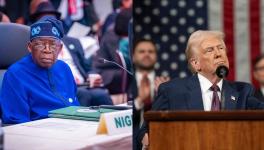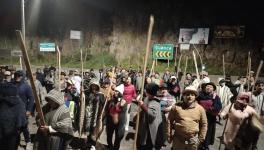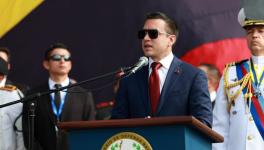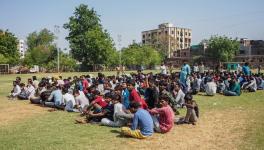Bangladesh Economy in Crisis, But $4.5 Billion IMF loan may be Double-edged Sword
Bangladesh has applied for a total of US $4.5 billion loan assistance from the International Monetary Fund (IMF) to deal with the ongoing economic crisis. This amount is equivalent to 42 thousand 750 crores in Bangladeshi currency (95 rupees per dollar). The economy of Bangladesh is under pressure from various aspects, including the continuous increase in commodity prices, energy crisis, dollar crisis in banks, decrease in expatriate income, declining reserves, massive money laundering, rising debt defaults, and collapse in export earnings.
In such a situation, the Bangladesh government sent a letter to the IMF last July asking for loan assistance. A delegation of ten members led by Rahul Anand, the head of Asian and Pacific department of the organisation, came to Dhaka on October 26 to discuss the loan assistance. The delegation has been meeting with various government departments since October 26. The meetings will continue till November 9. They have already held discussions with the Finance Ministry, Bangladesh Bank, Electricity Department, Commerce Ministry and National Board of Revenue (NBR).
Earlier, Bangladesh had taken loan assistance from the IMF four times. The first loan was taken in 1990-91. After that, Bangladesh took loans from the organisation in 2003-2004, 2011-12, and lastly, in 2020-21. However, the loan amount has never been beyond 100 million dollars. This time, Bangladesh has applied for loan assistance of 4.5 billion US dollars, breaking all previous records.
As a member of the IMF, Bangladesh is eligible to receive loans ranging from $100 to $150 million per year. As a result, loans have been sought separately from the three programs of the IMF — Enhanced Credit Facility (ECF), Enhanced Facility (EFF) and Resilience and Sustainability Fund (RSF) set up to combat the impacts of climate change. Loans taken from ECF are free of interest and charges. There is also a grace period of five and a half years to repay this ten-year loan. The loan interest rate from the remaining two funds is 1.54 to 1.79%.
Bangladesh does not only have IMF to deal with the ongoing economic crisis; The World Bank, Asian Development Bank (ADB), and Japan International Cooperation Agency (JICA) have also applied for loans for budget support. According to related sources, including the Economic Relations Department (ERD) in Bangladesh, discussions are going on with ADB about the budget assistance of 100 million dollars.
When journalists asked whether “the economy get relief if we get a loan from the International Monetary Fund (IMF)", MA Mannan, the Planning Minister of the Government of Bangladesh, said, "I have 100 taka in my pocket, if someone gives me another 10 taka, it will be a little better. Likewise, some temporary relief will be given to the IMF debt.”
However, Bangladesh sent a letter to the IMF last July asking for loan assistance, but the government did not accept it publicly at first. At that time, the finance minister of the Bangladesh government, AHM Mustafa Kamal, had denied seeking any loan from any foreign organisation, including the IMF. He had said, "Bangladesh has not sought any loan from the IMF." However, the loan offer will be considered if we really need it. But for now, we don't need a loan.'
But within a week, the finance minister himself admitted to the media that he had sought a loan from the IMF. As a result, since the beginning, there have been allegations of embezzlement by the Bangladesh government with correct information about seeking loan assistance from the IMF.
In order to receive IMF loan assistance, Bangladesh has to comply with several conditions and introduce several reforms in the financial sector. A decade ago, Bangladesh received an extended credit facility (ECF) of nearly $1 billion from the IMF in seven instalments. One of the conditions, on the contrary, was to enact VAT. The government of Bangladesh is giving several new conditions in view of the loan application of $450 million to the organisation. It has also proposed some significant reforms in the financial sector.
Analysts are debating how far the IMF's reform proposals and conditions can provide a solution to Bangladesh's ongoing economic crisis. Many say that the reform proposals and conditions that the IMF is giving to overcome the current economic crisis are helpful in stopping various irregularities in the financial sector of Bangladesh. However, several of the reform proposals may intensify the crisis.
IMF Reform Proposal:
In view of the application of the Bangladesh government, with the aim to provide loan assistance, the country's economic policy is currently talking about bringing several reforms of various institutions. On October 26, the visiting IMF delegation held three separate meetings with the Finance Department of the Ministry of Finance. In those meetings, the demands of the IMF, including reducing the subsidies given by the Bangladesh government in various sectors, came up.
According to sources at the meeting, the IMF has asked for reforms in the management of gas, electricity, and fertiliser subsidies. This reform means reducing the subsidy. The organisation has sought a time-bound plan from the government in this regard. Apart from this, they sought to know the plans to leave the big companies, which are kept running with subsidies to the private sector.
The visiting team sought to know the trends in the actual spending on education and health sectors from allocations to the social security sector. Besides, the IMF has asked to know about the government's plans to release the subsidies and loss-making state-owned enterprises to the private sector, including fuel oil, electricity, fertiliser and gas.
In an interview given to the media, Dhaka University's Economics professor and Director (Research) at the Center on Integrated Rural Development for Asia and the Pacific (CIRDAP), Mohammad Helal Uddin said, "The economy of Bangladesh is not in a position to negotiate with the terms whatever the IMF gives. So, Bangladesh has to take a loan.'
He also said, “This bad state of the economy is because the debt and domestic resources were not used properly in the past. Around 30% more than the actual cost has been spent in various sectors, including on development projects. If that was not done then the economy would not be in this condition.” He further told NewsClick, “There is talk of recession or famine ahead. But the government does not have the capacity to feed people from its funds. So, the government has to spend the debt properly this time. Be frugal. The corruption must be stopped.”
Executive Director of the South Asian Network on Economic Modeling (SANEM) and Professor at the Economics Department of Dhaka University. Salim Raihan told NewsClick, “The government has not taken any loan from the IMF in the last decade. Why have to take a big loan now? Because the economy is under pressure. This loan has to be taken to bridge the reserve crisis and support the budget.”
If the loan is not used properly, the crisis will increase. Raihan said, “Bangladesh's foreign debt is increasing, but it has not reached a critical point. However, every year after 2026, Bangladesh will have to pay back four to five billion dollars of debt with interest. Then there will be pressure. So, if the loan is not used properly, there will be a crisis.”
Get the latest reports & analysis with people's perspective on Protests, movements & deep analytical videos, discussions of the current affairs in your Telegram app. Subscribe to NewsClick's Telegram channel & get Real-Time updates on stories, as they get published on our website.
























